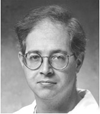The public imagines that doctors protect each other. The reality is far more complicated. Medicine, at least hospital medicine, is a fishbowl. If Doctor Y turns up for rounds with a black eye on the fifth floor, we are likely to hear about it (in gossipy tones) in the OR that same morning. Think of a hospital as a big cubicle barn without the barriers. Nevertheless, disciplining physicians is tricky business.
First, my credentials. I have served as Chief of Staff at two hospitals, and have been in hospital leadership for two decades. I have had death threats against me and my children, almost certainly as a consequence of physician disciplinary activities during my time as chief of staff. I have been involved in dozens of disciplinary actions at all levels, and in retrospect, I've been generally satisfied with outcomes for patients and physicians.
Second, all the following is purely experiential and anecdotal (and, as they say, the plural of anecdotal, is not data) and in no way represents any science, behavioral or real (sorry, you psychologists-I couldn't help it...).
Impaired physicians seem to present in three broad types; physicians with cognitive impairment, (poor judgment, poor skills) physicians with drug/alcohol problems, and physicians with behavioral problems. Of these three, the third is far and away the most common, and further roughly divides into three categories; doctors with true, decompensated psychiatric problems, docs who are sexually harassing, and those with anger problems.
In my experience, of these, the most successfully helped are the drug addicted; inpatient programs (especially Talbot in Atlanta) are rigorous, the mechanism for follow-up and testing is top notch most places, and I know a number of talented clinicians who have had long and successful careers following treatment. As a matter of fact, I can't think of a single unhappy outcome in drug abusing physicians who have gone through an inpatient program like Talbot's. Most tragic outcomes for drug-using physicians have been in those practitioners who do not have their problems diagnosed, and who subsequently succumb to an overdose, or worse, a syringe swap with a paralytic (I know of two of those. One died, one didn't). My experience is that drug use amongst anesthesiologists and other physicians is virtually transparent; with one exception, those docs who I have known who were using drugs showed no outward signs of impairment. No noticeable bad outcomes, no alteration in interactions.
Alcohol is tougher. Nasty drug for those addicted. Part of the problem is the supervisory/oversight system, which is much more permissive for alcohol than narcotics. Twelve step programs are great for the motivated, but there's nothing quite like random drug testing to reinforce behavior.
Sexual harassment was lots more common 20 years ago; I suspect it's because it wasn't taken seriously until the Feds made it a civil rights issue, and sanctioned businesses (like hospitals) who tolerated it. Now, hospital administrators are very aggressive in addressing harassment allegations. The consequences of turning a blind eye to the nasty mischief of high-volume admitters, a common feature of hospitals thirty years ago, now holds too much financial risk for the institution (huge fines and civil suits). Usually, firm limit-setting with the affected practitioner is sufficient.
Affected practitioner is the formal term-of-art for a physician who has come under scrutiny for impairment; the disciplinary pathway for affected practitioners are always carefully spelled out in hospital bylaws, and must be adhered to in the strictest fashion lest the affected practitioner (and his attorney) establish standing before the courts to challenge any adverse recommendations by the hospital. Yes, it's true-affected practitioners are afforded numerous due process rights as a matter of legal necessity and fairness.
A typical hospital plan has incidents reviewed by the department chairperson, who makes recommendation to the Medical executive Committee (the MEC usually consists of the Chief and vice-chief of Staff, who are elected by the medical staff, all the physician department heads, and various other elected or appointed physician leaders. It typically meets once a month. An MEC must exist in every accredited hospital per the Joint Commission, and it is the only physician committee a hospital is required to have. The MEC then makes a ruling, which, if it is adverse to the physician, may be appealed by the affected practitioner to a committee of his or her non-competitor physicians, called a fair hearing committee. The fair hearing committee reviews the circumstances, and makes a recommendation back to the MEC. Usually, the fair hearing committee can say whatever they like (and often do), but the MEC has the final authority... to make a recommendation to the Board of Trustees. A hospital board of Trustees usually consists of physicians (including the chief of staff) and community leaders appointed by the CEO or elected by current trustees, depending upon whether the hospital is for-profit or not-for-profit. The board makes the final determination concerning a disciplinary action.
The MEC is merely advisory to the Board, which usually has the power to grant and relinquish privileges; this provides a layer of legal insulation to the MEC, but also significantly weakens physician influence over the hospital environment. I have always found Trustees to be highly concerned about the care environment, and to take my and my leadership colleagues' advice seriously. I know of other institutions, however, where the Board is a tool for the CEO to advance the hospital's business agenda, with care being treated more like a "product."
All of this "due process" takes time; months. What can be done to curtail dangerous practitioners in the meantime? Summary suspension. A summary suspension is an immediate suspension of privileges, enacted by the Chief of Department, Chief of Staff or CEO to exclude a physician from care. Typically, bylaw language specifies that summary suspension be enacted for "a physician who represents a threat to patients, the staff, or themselves." A summary suspension is instituted if a physician were obviously drunk or belligerent (both have happened) or seems cognitively impaired in some other way (also). I have known of physicians needing to be escorted out by security. It was unpleasant. Usually, a summary suspension is followed in short order (<72 hours) by an emergency meeting of the MEC to review the matter and uphold the suspension. I have known an MEC to reverse a summary suspension, but usually, it is upheld. Contract physicians (i.e. ER, most anesthesiologists and radiologists) frequently sign a clause waiving their due process rights. Their privileges then are in control of the corporate contracting entity.
 As I suggested earlier, the most common form of behavioral impairment
is "acting out" in anger. Even this has improved over the decades; when
I was young, surgeons throwing instruments AT staff (sometimes
sharp instruments!) was not unheard of, and physical assaults by "distinguished"
surgical professors on anesthesiologists, either in anger or as a form
of intimidation, went unpunished. (I witnessed them.) Usually,
administration's efforts in those circumstances were to "hush up" the resulting
rumors. That stuff is no longer tolerated.
As I suggested earlier, the most common form of behavioral impairment
is "acting out" in anger. Even this has improved over the decades; when
I was young, surgeons throwing instruments AT staff (sometimes
sharp instruments!) was not unheard of, and physical assaults by "distinguished"
surgical professors on anesthesiologists, either in anger or as a form
of intimidation, went unpunished. (I witnessed them.) Usually,
administration's efforts in those circumstances were to "hush up" the resulting
rumors. That stuff is no longer tolerated.
Anger and acting out (bullying, etc) responds to strict limit-setting. A stern meeting with the CEO and Chief of Staff usually does it. This meeting is often accompanied by a "Zero tolerance" contract, signed by the affected practitioner and CEO. A zero tolerance contract specifies summary suspension for recurrence of the practitioner's behavior. Angry docs usually backslide; there is almost always a run-up of escalating misbehavior before an angry practitioner "blows" again. After some experience, I used to know how often to call individual affected practitioners (every two months, every 4 months - it varied from doc to doc) to remind them to behave. Mostly, these doctors are capable clinicians; good outcomes, good skills. In managing the disciplinary chores for these sorts of folks, I considered that I was doing the community (and these practitioners and their families) a service by keeping them "on line." Of course, these practitioners never saw it that way; nobody likes having limits set... As we say, "No act of nobility or kindness will go unpunished..." A personable moslem cardiac surgeon (and not an affected practitioner) once said to me; "you are a good man, but you are not a nice man." Maybe that's true; if so, so be it.
What about the occasional frustrated outburst from stressed, over-tired physicians? Some old, very wise senior colleagues of mine here in Las Vegas developed a "behavioral algorithm" that was nationally circulated. Prior to that, behaviorally impaired physicians were treated as if they had a drug abuse problem (with singularly unimpressive results); or, more often, their behaviors were simply ignored. I was there for the inception of this algorithm, and helped iron out the functional details. For non-critical occurrences, we used the rule of three; three "significant" events in a two year period mandated colleagial evaluation and counseling, significant being defined on an incident-by-incident basis by the department chairperson, with help from administration and elected leadership. It works.
There's so much I've left out; confidentiality, affected practitioner insight, cognitive or psychiatric impairment, "tales from the front." I guess I'll make a separate post later on this; stay tuned if you're interested.
 Mitch Keamy is an anesthesiologist in Las Vegas Nevada
Mitch Keamy is an anesthesiologist in Las Vegas Nevada
 Andy Kofke is a Professor of Neuro-anesthesiology and Critical Care at the University of Pennslvania
Andy Kofke is a Professor of Neuro-anesthesiology and Critical Care at the University of Pennslvania
 Mike O'Connor is Professor of Anesthesiology and Critical Care at the University of Chicago
Mike O'Connor is Professor of Anesthesiology and Critical Care at the University of Chicago
 Rob Dean is a cardiac anesthesiologist in Grand Rapids Michigan, with extensive experience in O.R. administration.
Rob Dean is a cardiac anesthesiologist in Grand Rapids Michigan, with extensive experience in O.R. administration.
Great information. Thanks for sharing.
Rita Schwab, CPCS, CPMSM
Posted by: Rita Schwab | August 14, 2024 at 04:08 AM
This is a really excellent treatise on a complex subject.
Funny story: the day Mount St Helens blew, 20ish years ago, my father in law (an anesthesiologist) was chief of staff of a hospital several miles north. The explosion, though quite far away, was loud enough that he thought it might have been a bomb on his property. The reason he thought so was that he'd been involved in the very bitter restriction of a practioner, known for disturbing and unstable behavior.
Posted by: Sid Schwab | August 23, 2024 at 03:59 PM
PS: no relation. To Rita, that is.
Posted by: Sid Schwab | August 23, 2024 at 04:00 PM
Sid, that's pretty (Ha Ha) funny because A.) been there-I had to hire a private detective and work out family security, and B.) it wasn't really a bomb. Thanks for dropping by; you've been on a hot streak at your blog- the hits keep coming!
Mitch
Posted by: mkeamy | August 23, 2024 at 06:26 PM
Oh Dr. Sid - deny it all you want, I bet we're related somewhere along the way! :)
Rita
Posted by: Rita Schwab | September 07, 2024 at 06:59 PM
Thanks for the blog. It's interesting.
Posted by: Gibbitt | April 28, 2024 at 03:10 PM
Can you give an example of a significant event? We have a practicioner in our clinic that shows some symptoms of being emotionally unstable, maybe even untreated bipolar disorder. The office staff (both medical and business) would probably state that it is not the one significant event but the day-to-day "walking on egg shells" to see who shows up Jekyl or Hyde.
Posted by: Michele | June 18, 2024 at 03:31 PM